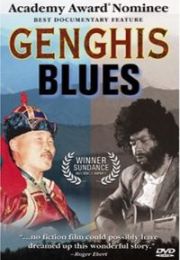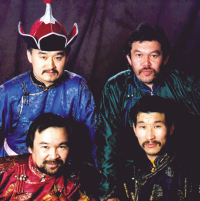 I watched the documentary Genghis Blues the other night for the first time in a long time, and it freaked me out a bit to realize that there was an entire chapter of my life that I have hardly shared with anybody, that has influenced me greatly, that I count as one of the happiest stretches I’ve ever been through, and that exists as a strangely self-enclosed parenthetical in my life. I’ve met a surprising number of the people who appeared in that movie.
I watched the documentary Genghis Blues the other night for the first time in a long time, and it freaked me out a bit to realize that there was an entire chapter of my life that I have hardly shared with anybody, that has influenced me greatly, that I count as one of the happiest stretches I’ve ever been through, and that exists as a strangely self-enclosed parenthetical in my life. I’ve met a surprising number of the people who appeared in that movie.
Like a lot of Americans who know anything at all about the country of Tuva and Tuvan throat singing, I was first exposed to this method of producing and modulating several notes at once when I saw an old episode of Nova called “Tuva or Bust,” concerning physicist Richard Feynman’s efforts to get to a Shangri-La-seeming country called Tuva in northern Mongolia.
On the Nova episode they played some excerpts of Tuvan throat singing and I was hooked. It sounded like a human being imitating a didgeridoo but singing flute-like melody above the fundamental drone. I’d never heard anything like it. At the time I was interested in the didgeridoo but had not yet learned to play it. I hunted down some CDs (this was just as the Internet was making things easily trackdownable), familiarized myself with some of the styles, and started teaching myself how to do it.
One day soon afterward I learned that Paul Pena would be playing a show at the central library. Pena had been the subject of an incredible documentary called Genghis Blues. He was a blind blues musician who heard Tuvan throat singing on his shortwave radio, taught himself Tuvan, taught himself throat singing, met Ondar in San Francisco at a show, and ended up traveling to Tuva to compete in an annual contest.
I went and saw Ondar & Pena and it was startling to realize the varieties of human ability. The show was incredible.
 Yahoo Groups were a big new thing then, and I formed a group for Tuvan Throat Singing. It gradually got about 500 members, as I recall. Through this network I learned that a Tuvan group called Huun Huur Tu was going to be playing at McCabe’s in Santa Monica; one of the Yahoo grop members was associated with the tour. I met Huun Huur Tu and was invited backstage, and then was invited to their hotel.
Yahoo Groups were a big new thing then, and I formed a group for Tuvan Throat Singing. It gradually got about 500 members, as I recall. Through this network I learned that a Tuvan group called Huun Huur Tu was going to be playing at McCabe’s in Santa Monica; one of the Yahoo grop members was associated with the tour. I met Huun Huur Tu and was invited backstage, and then was invited to their hotel.
Where we all got roaring drunk.
Tuva is a part of the Russian Federation, and Tuvans tend to speak fluent Russian. So when guests complained about the noise and the security guard showed up to tell us to keep it down, then turned out to be a Russian immigrant, he ended up staying and getting drunk with us. Then a group of ridiculously attractive girls from Russia who were staying at the hotel just showed up out of nowhere and flirted like crazy. (Could I make this up?)
At one point the band members asked to hear me sing. After hearing them, that was about the last thing I wanted to do, but I gave it a shot. Bopa kept putting his hand on my chest and saying “From here! From here!” I kept trying to figure out what muscles I had to use to make the sound come from lower in my chest. Finally he said, “No, no — too much here.” And tapped his head. “More here,” he said. And tapped his chest. Not more chest, Steve. More heart.
I learned more about art with those guys in one drunken night than I’d learned in all the previous decades.
I played the didgeridoo while the band huddled around me and sang. That was amazing. A musical earthquake. They freaked out when I began playing “Arte Sayir,” a famous Tuvan melody, as overtones on the didge. I’ve never heard anyone modulate overtones on a didgeridoo in a melodic way, but throat singing had taught me how.
The Yahoo Group grew stoopidly mystical and I pulled the plug on it. I saw Huun Huur Tu a few more times (and was delighted that my wife, an amazing composer, got to meet them), but after I got into DJing and dance music I kind of drifted from overtone singing and that community. That one, planetary-alignment night all came back in one unalloyed rush while I was watching Genghis Blues. Drunken huddling and delicate melodies over beautiful earthquakes. A hand on my chest: More heart.
It was one of the most fun nights I’ve ever had.
Ondar on Letterman:
I want this played at my funeral:
I’ve never heard this type of singing. It’s kind of fucking amazing. Thanks for sharing.